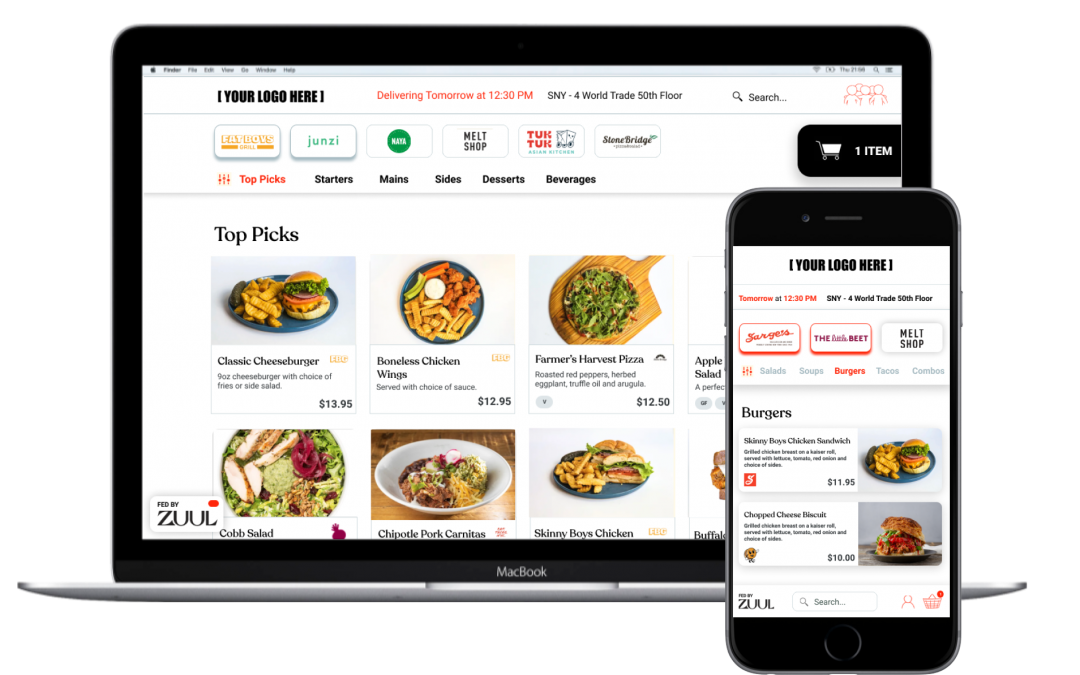As it diversifies beyond its formative days as a Manhattan ghost kitchen, Zuul is now moving into the restaurant technology space with the release of its ZuulOS that helps operators manage multi-brand restaurant and ghost kitchen operations. It’s an increasingly crowded space, as the restaurant software industry reacts to the fast rise of ghost kitchens and virtual restaurants.
 Zuul’s new software platform is designed expressly for the pandemic-altered future of the restaurant industry where more restaurants are experimenting with delivery-only concepts in multi-tenant ghost kitchens and within existing restaurant spaces with excess kitchen capacity.
Zuul’s new software platform is designed expressly for the pandemic-altered future of the restaurant industry where more restaurants are experimenting with delivery-only concepts in multi-tenant ghost kitchens and within existing restaurant spaces with excess kitchen capacity.
ZuulOS includes multi-brand native delivery, consolidated delivery logistics, solutions to manage coupons, promotions and variable commission structures, as well as demand generation through the Zuul Market platform that batches deliveries to offices and residential buildings.
“With our acquisition of Ontray in 2019 and subsequent launch of Zuul Market in 2020, we see an opportunity to scale our partnerships-driven delivery model by working with best-in-class operators innovating with virtual brands and starting their own ghost kitchens,” said Zuul co-founder and CEO Corey Manicone.
Zuul Chief Technology Officer Tyler Wiest, also the founder of Ontray Technologies, said the ability to drive batched deliveries to buildings “is a unique feature set we believe adds immense value to a new class of operators emerging as virtual brands and ghost kitchens continue to proliferate.”
The debut of ZuulOS came with a little something on the side: the announcement of a new partnership with Aurify Brands, parent company of Five Guys, Melt Shop and The Little Beet. Aurify is working with Zuul as it launches a multi-brand ghost kitchen out of its Midtown location that had previously relied upon strong foot traffic.
“We realized we could bundle our brands together into one guest experience to generate more revenue from a single location, all made possible through ZuulOS,” said Becky Mulligan, CEO of The Little Beet, Le Pain Quotidien US and The Little Beet Table. Now servicing a portfolio of Zuul Market buildings in Midtown Manhattan, Aurify’s location also features Five Guys, Melt Shop and a virtual brand from The Little Beet team called Eat Tacos.
 Zuul Chief Operating Officer Kristen Barnett said her team is “fundamentally trying to change the nature of food delivery itself.” As the industry grapples with the rise of delivery apps and wildly different customer behavior, she said the company’s multiple endeavors are intended to create a more profitable, equitable and sustainable model for restaurant operators.
Zuul Chief Operating Officer Kristen Barnett said her team is “fundamentally trying to change the nature of food delivery itself.” As the industry grapples with the rise of delivery apps and wildly different customer behavior, she said the company’s multiple endeavors are intended to create a more profitable, equitable and sustainable model for restaurant operators.
As most restaurant software wasn’t built for all of the complexities, accounting and menu management of multi-concept delivery operations in a variety of formats, Barnett said ZuulOS extends to an “intelligent” kitchen management system that also addresses the back-of-the house challenges like order accuracy and workflow management.
“It’s not an easy thing to do at scale when you’re running your business,” she added. “We are trying to meet the needs of operators who are looking to build multi-brand businesses—that’s really what it is—so we have designed our entire product to be a really multifaceted and complex architecture that hopefully boils down all of that complexity into something that’s relatively simple and malleable to meet the needs of all these very interesting business models that are popping up.”
While ZuulOS is aimed at operators bringing virtual brands into existing kitchens, it’s also intended for food halls that have also been forced to bring their businesses into the digital and delivery worlds as office districts remain largely empty. Zuul believes most food halls will evolve into a “hybrid food hall ghost kitchen setup” with an opportunity to rethink a business model that was built upon sustainable foot traffic.
Zuul sees its role, as the real estate profile of the industry shifts, as helping restaurants build a native delivery business that isn’t dependent upon third-party delivery platforms.
“We would like to see the industry weaned off of third-party apps, [and] our goal is that any operator that uses ZuulOS can eventually shut them off,” Barnett said. “We hope that ZuulOS is that option for ghost kitchen operators as they navigate this landscape with, I think, pretty challenging financial structures offered by the dominant players.”


